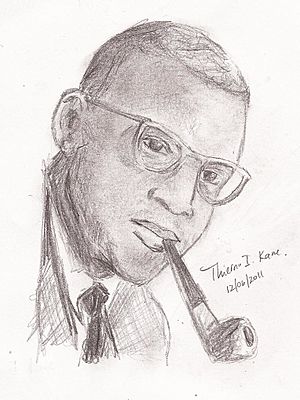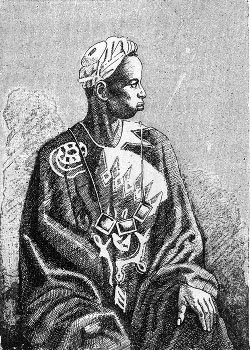Birago Diop facts for kids
Quick facts for kids
Birago Diop
|
|
|---|---|

Sketch of Birago Diop
|
|
| Background information | |
| Birth name | Birago Ismaël Diop |
| Born | 11 December 1906 Ouakam, Dakar, Senegal, French West Africa |
| Origin | Wolof |
| Died | 25 November 1989 (aged 82) Dakar, Senegal |
| Occupation(s) | Poet, storyteller, veterinarian, diplomat |
Birago Diop (born December 11, 1906 – died November 25, 1989) was a famous writer and storyteller from Senegal. He helped people become interested in African folktales again. He was also a skilled veterinarian (animal doctor) and a diplomat (someone who represents their country). Diop was a key person in the Négritude movement, which celebrated African culture. He was truly a "renaissance man" – someone good at many different things.
Contents
Birago Diop's Early Life
Birago Diop was born on December 11, 1906, in Ouakam, a part of Dakar, Senegal. His parents were Ismael and Sokhna Diop. His mother raised him and his two older brothers. Sadly, his father disappeared before Birago was born. Growing up, Birago heard many traditional folktales. These stories later became a big part of his writing.
In 1920, Birago received a scholarship. This allowed him to attend Lycée Faidherbe in Saint-Louis. Saint-Louis was the capital of Senegal at that time. There, he loved reading poems by famous writers. These included Victor Hugo and Edgar Allan Poe. He soon started writing his own poems. In the late 1920s, he worked as a nurse in a military hospital. Later, he studied veterinary medicine in France. He graduated from the University of Toulouse in 1933.
Birago Diop's Career
Birago Diop was well-known for his poems and folktales. But he also worked as an animal doctor. He served the French government in several West African countries. From 1937 to 1939, he worked in French Sudan (now Mali). In 1940, he was in the Ivory Coast and French Upper Volta. He also worked in Mauritania in 1950. During his time as a civil servant, he collected and rewrote Wolof folktales. He also wrote poetry, memories, and a play. From 1960 to 1965, he was Senegal's first ambassador to Tunisia.
Early Writing and the Négritude Movement
While studying in France, Diop met many students. They came from Africa, America, and the Caribbean. One of them was Léopold Sédar Senghor. Senghor later became Senegal's first president. These young thinkers inspired Diop. He wrote his first poems for L'étudiant noir ("the black student"). This student magazine helped start the Négritude movement. This movement celebrated African culture and protested against losing African traditions.
Inspiration for His Stories
Birago Diop worked as the head of cattle inspection. This job took him to many parts of Senegal and Mali. During this time, he heard many traditional folktales. He remembered most of them. These stories became the main inspiration for his writing. Most of his poems and tales come from African oral traditions.
These folktales were often told at night by a professional storyteller. This storyteller was called a griot. People would then repeat the stories in other places. These storytelling events often included songs and dances. The tales were for fun, but they also taught younger generations. They shared the beliefs and values of their ancestors. Diop used his skill in the French language and his knowledge of African tales. This helped him share his ancestors' values with the world.
Writing During and After World War II
In the early 1940s, during World War II, Diop had to return to France. He stayed there for two years. He missed his home very much. His fellow Négritude writers told him to write down folktale adaptations. Here is a small part from his story "The Humps." It shows how much he missed home:
"Here, far from my home in Senegal, my eyes are surrounded by closed horizons. When the greens of summer and the russets of autumn have passed, I seek the vast expanses of the Savannah, and find only bare mountains, sombre as ancient prostrate giants that the snow refuses to bury because of their misdeed...."
When Diop returned to Africa, he worked in animal services. He worked in the Ivory Coast and Upper Volta. His first book, Les Contes d'Amadou Koumba, came out in 1947. This work had three parts. It won him the Grand prix littéraire award. Each part was a collection of short stories. Many of them were about animals. He wrote them down exactly as he heard them from the griot Amadou Koumba. These tales mixed humor, fantasy, and real-life situations. People, magical beings, and animals all interacted in them.
"The Broken Pen"
When Senegal became independent, Diop became the first Senegalese ambassador to Tunisia. When he took this job, he said he had "broken his pen." This meant he planned to stop writing. He wanted to focus on his work as a diplomat. But in the mid-1970s, his "pen was mended." He published La plume raboutée in 1978. After that, he wrote À rebrousse-temps (1982), À rebrousse-gens (1982), and Senegal du temps de...(1986).
Birago Diop's Death
Birago Diop passed away on November 25, 1989, in Dakar. He was 83 years old. He was survived by his wife, Marie-Louise Pradére, and their two children, Renée and Andrée. Birago Diop is remembered as a novelist, diplomat, and a founder of the Négritude movement. He was also a veterinarian. Even today, his stories and poems continue to share African values and culture.
List of Birago Diop's Works
- Stories
- Tales of Amadou Koumba (Les contes d'Amadou Koumba, 1947, translated 1966)
- New Tales of Amadou Koumba (Les nouveaux contes d'Amadou Koumba, 1958)
- Tales and Commentaries (Contes et Lavanes, 1963)
- Contes Choisis (1967)
- Contes d'Awa (1977)
- Poems
- Lures and Glimmers (Leurres et Lueurs, 1960)
- Plays
- L'os de Mor Lam (1977)
- Memories
- La Plume raboutée (1978)
- A rebrousse-temps (1982)
- A rebrousse-gens (1985)
- Du temps de... (1986)
- Et les yeux pour me dire (1989)
Awards Birago Diop Received
- Grand Prix Littéraire de l'Afrique-Occidentale Francaise for Les Contes d'Amadou Koumba
- Association des Ecrivains d'Expression Francaise de la Mer et de l'Outre Mer, Grand Prix Littéraire de l'Afrique Noire for Contes et lavanes
- Officier de la Légion d'Honneur
- Chevalier de l'Étoile Noire
- Chevalier du Mérite Agricole
See also
 In Spanish: Birago Diop para niños
In Spanish: Birago Diop para niños


